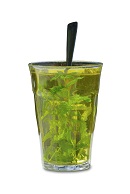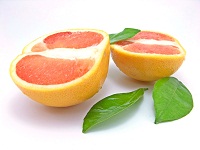Dental hygiene depends a lot on what we eat (which makes sense, since it goes through the mouth). Coda Health Kitchen and Dental Health Colorado want you to use food as your treatment for bad breath! Please read below for tips and tricks and ingredients that you can incorporate into your diet to get you on the better breath bandwagon.
 First, here’s the problem, halitosis is usually caused by bacteria that live in your mouth that put off waste products called volatile sulfur compounds. When you (or your partner) smell your breath, you are smelling the by-product of hundreds or thousands of VSCs on your tongue produced as bacterial waste. You can tell by looking at your tongue; if it is covered by a thin white substance, bacteria has begun to flourish and you will need to do something about that. We offer tongue scrapers at Coda Health Kitchen to maintain this film as part of an oral health best practice.
First, here’s the problem, halitosis is usually caused by bacteria that live in your mouth that put off waste products called volatile sulfur compounds. When you (or your partner) smell your breath, you are smelling the by-product of hundreds or thousands of VSCs on your tongue produced as bacterial waste. You can tell by looking at your tongue; if it is covered by a thin white substance, bacteria has begun to flourish and you will need to do something about that. We offer tongue scrapers at Coda Health Kitchen to maintain this film as part of an oral health best practice.
Changing your diet and adjusting the foods you eat can help.
Avoid eating onions, garlic and foods that are high in sugar on an excessive basis. This is because they either contain sulfur compounds (like onion and garlic) or are loaded with substances that cause bacteria to grow.
Coffee, tea, cola, and tobacco can stain your teeth and make your breath smell equally bad. If you’ve already had a bout with these substances, we offer teeth whitening in our Dental Health Colorado offices.
Now we can discuss the foods that you can use to improve your breath.
![]()
Green tea is a marvelous beverage that is antibacterial, meaning it actually inhibits the growth of bacteria in your mouth.

![]() Yogurt is another great choice; eating (non-processed) yogurt daily will not only help with your bad breath, but will give you plenty of vitamin D. Yogurt basically makes your mouth a very unfavorable climate for bacteria – and it tastes good, too.
Yogurt is another great choice; eating (non-processed) yogurt daily will not only help with your bad breath, but will give you plenty of vitamin D. Yogurt basically makes your mouth a very unfavorable climate for bacteria – and it tastes good, too.
![]() “Coriander, spearmint, tarragon, eucalyptus, rosemary and cardamom are all good for fighting bad breath,” says Dr. Christine Gerbstadt, who has lectured on oral health. You can chew on fresh herbs or make tonics by steeping them in hot water (as a tea). These herbs make an excellent digestive as well—doubling the benefits of ending a meal this way.
“Coriander, spearmint, tarragon, eucalyptus, rosemary and cardamom are all good for fighting bad breath,” says Dr. Christine Gerbstadt, who has lectured on oral health. You can chew on fresh herbs or make tonics by steeping them in hot water (as a tea). These herbs make an excellent digestive as well—doubling the benefits of ending a meal this way.
![]() A recent study found that a serving of yogurt each day reduces the level of odor-causing hydrogen sulfide in the mouth. Apparently it also cuts back on bacteria in the mouth—plaque and gum disease were reduced in the study’s yogurt eaters as well. Plus, the American Dietetic Association (ADA) recommends getting enough vitamin D from yogurt, cheese and milk if you’re worried about halitosis because this vitamin creates an inhospitable environment for bacteria growth. Be sure to get the kind of yogurt with active cultures—not overly processed or sugar-added varieties.
A recent study found that a serving of yogurt each day reduces the level of odor-causing hydrogen sulfide in the mouth. Apparently it also cuts back on bacteria in the mouth—plaque and gum disease were reduced in the study’s yogurt eaters as well. Plus, the American Dietetic Association (ADA) recommends getting enough vitamin D from yogurt, cheese and milk if you’re worried about halitosis because this vitamin creates an inhospitable environment for bacteria growth. Be sure to get the kind of yogurt with active cultures—not overly processed or sugar-added varieties.

![]() Eating berries, citrus fruits, melons and other vitamin C-rich foods create an inhospitable environment for bacteria growth. A diet rich in vitamin C is also is important for preventing gum disease and gingivitis—both major causes of halitosis. Get your C in foods, not supplements, which can cause gastrointestinal upset in some, according to Sass, and exacerbate bad breath.
Eating berries, citrus fruits, melons and other vitamin C-rich foods create an inhospitable environment for bacteria growth. A diet rich in vitamin C is also is important for preventing gum disease and gingivitis—both major causes of halitosis. Get your C in foods, not supplements, which can cause gastrointestinal upset in some, according to Sass, and exacerbate bad breath.
![]() Finally, any crunchy food that has fiber – such as apples, celery, carrots, pears, or other fruits and vegetables that are high in fiber – is terrific for bad breath because it helps remove plaque that forms on your teeth.
Finally, any crunchy food that has fiber – such as apples, celery, carrots, pears, or other fruits and vegetables that are high in fiber – is terrific for bad breath because it helps remove plaque that forms on your teeth.
For more information on bad breath, visit the Mayo Clinic’s page on halitosis.
Excerpts taken from Healthy Living at MSN